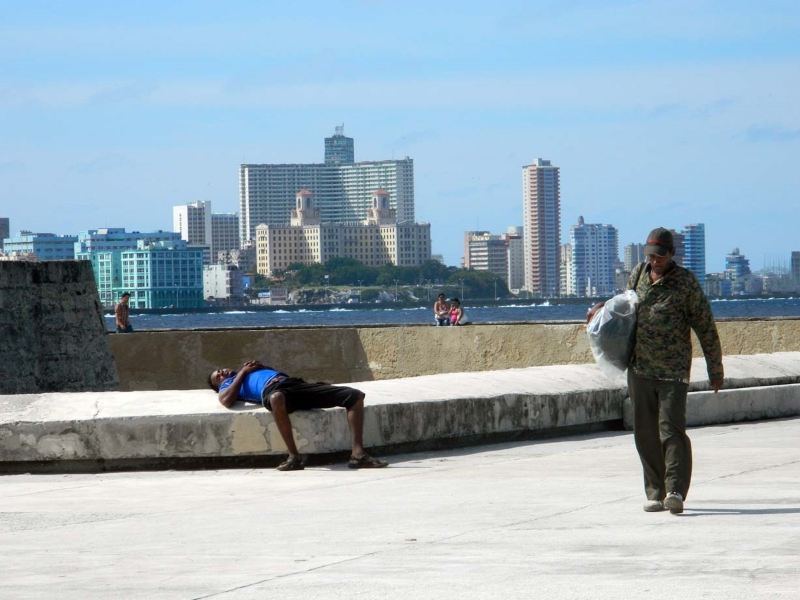Havana Cuba. — When I was a child I used to run into a bearded mulatto, forty-year-old, stocky, with the looks of a boxer, who every day, at any hour, would pull a wooden cart loaded with rubble across the street. Causeway of October Tenin one direction or another. He wore clothes made from jute sacks, smoked cigarette butts he picked up from the ground in a huge pipe, and barely spoke words.
People said that he was from Párraga, that he had been a policeman during the Batista regime, that he had several deaths to his credit, and that from hiding and feigning insanity to escape from jail or the wall, he went crazy.
The last time I saw him, he was no longer pulling the cart. It was in a bus, more than 25 years ago. He was very old and much skinnier, and the passengers fled from him, but no longer because of fear and his bad reputation, but because he stank of lightning.
My childhood in La Víbora was populated by crazy people: Violeta, Guayaba, Pela-muertos, Juana Macho, La Marquesa and La China, who advised to be “honestly, working”…
Each neighborhood in Havana had its crazy people, they were part of the landscape. But the main one of all, the Knight of Paris, was a symbol of the city. He always dignified, dressed in black, skin like wax, his chest lined with newspapers inside his jacket, if he was cold; with his beard before that of the bearded rebels, and the long, curly mane long before that of Robert Plant.
The Knight of Paris he died in a nursing home, a few years after authorities picked him up. They peeled and shaved him, bathed him and assigned him, at the expense of the State, clean clothes, medicines, breakfast, lunch and dinner. In the capital of the revolutionary paradise that they wanted to show to the supportive visitors, it was not good to see that a madman, no matter how emblematic he was, wandered down the street.
After the debacle of the special period, there is no longer any modesty in hiding the crazy people. What’s more, certain fools from Old Havana, opportunely disguised as customary characters -licences through-, were turned into tourist attractions. If the jineteras are, why aren’t they?
A decade ago, Manolito Simonet and his Trabuco proclaimed, to the rhythm of timba, that “in Havana there is a pile of crazy people.” And it is that in Havana there were always many crazy people wandering the streets, but not as many as you see today.
You don’t have to be a sociologist to explain the proliferation of insane people who roam the streets: the oppressive stress everyday life, poor diet, lack of medicines and a long etcetera.
In psychiatric hospitals, unless they are serious cases and they do not have relatives to care for them, it is difficult to get admission. Total, if there are not even medicines for patients there.
I know people who have had to buy the pills needed by their relatives admitted to Mazorra on the black market, because the hospital management has informed them that they do not have them and do not know when they will be available.
The crazy people of my childhood were kind and sometimes even nice. They did not even remotely incur in the impertinence and even the aggressiveness of those I now see on the sidewalks of Havana, harassing tourists or yelling in the buses crowded with people sweaty and anguished by daily problems. When they’re not shouting, they bellow boleros (Benny Moré seems to be his favourite), Mexican rancheras, or ballads by Nelson Ned.
Many went from alcoholism to dementia. The worst thing is that they still reek of alcohol. Drink, added to hunger, considerably complicates things in the madmen. Especially if they have been to jail.
In recent years, the number of insane people asking for food or money around cafeterias has increased. Some hate shines in their eyes, as if we were all guilty of what is happening.
On route P6 I usually see an octogenarian who lives in the Reparto Eléctrico district, who, as he himself assures that he fought in the Sierra and is willing to die for the Revolution, proclaims in a loud voice: “I am the yuma.”
The number of crazy people who claim to have earned degrees in the Sierra Maestra, Girón or Angola is amazing. Some boast of being very close to the bosses, of talking face to face with them. People, when they hear them, comment that “they got burned because of this.”
But there are also many—and there are more and more—those who burst into insults against the regime. Sometimes I hear some fools say truths that the sane do not dare to express loud and clear. And I can’t understand why someone can be laughed at or upset by what they say; as if the delirious and worn-out speech of the bosses was not much more absurd and annoying. As if we weren’t all, in one way or another, patients of the great dilapidated asylum that the country turned us into by some crazy people with communist cards.
OPINION ARTICLE
The opinions expressed in this article are the sole responsibility of the person who issues them and do not necessarily represent the opinion of CubaNet.
Receive information from CubaNet on your cell phone through WhatsApp. Send us a message with the word “CUBA” on the phone +525545038831, You can also subscribe to our electronic newsletter by giving click here.














